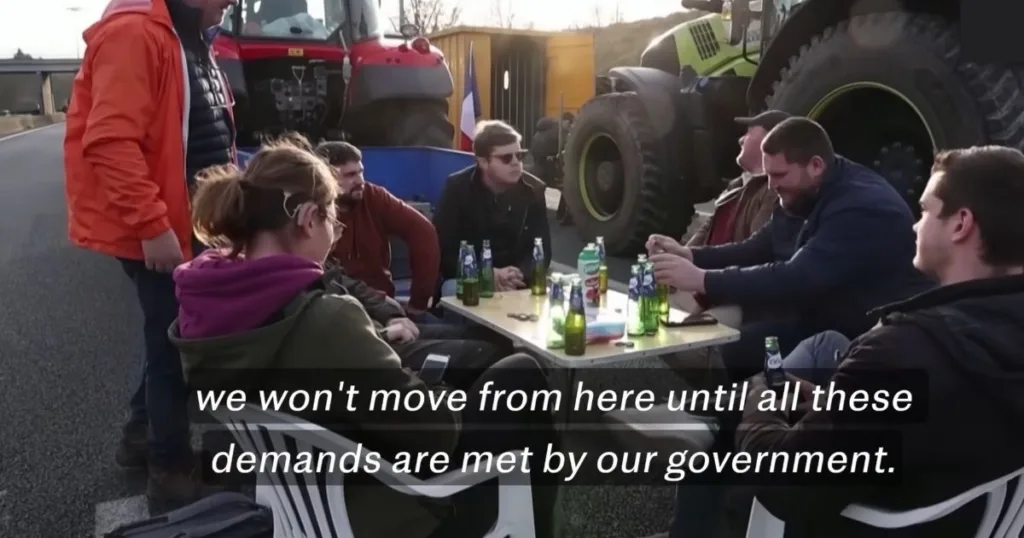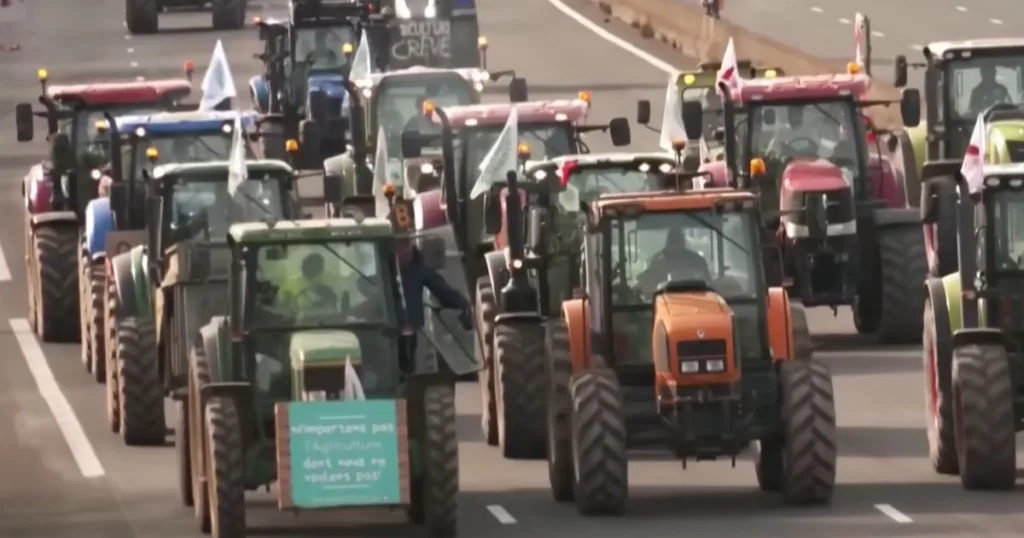
Why Farmers Are Protesting In Europe: How EU Hypocrisy Is Hurting Family Farms
More Than A Dozen Nations Across Europe Are Seeing Farmers Take To The Streets, Highways and City Centers - Farmers Are Demanding Change And Making Their Voices Heard

- Nathan Heinrich
- Rome, Italy
Share This Article
Partly because I am the son of a 6th generation farming family, and partly because I live in Europe, the recent European farmer protests have been a subject of special interest to me.
In our modern world of extreme polarization and alternative facts, it is becoming ever more difficult to know who, or what message, to trust on any given topic.
I will do my best to share the facts with you in this article as well as share what local farmers and EU politicians are saying.
European Farmers Are Fed Up With Unfair EU Policies
Farmers across Europe, particularly in Italy, France, Spain, Germany, Poland, Ireland, The Netherlands, and half a dozen other nations, have taken to the streets in recent weeks to protest what they say are “unjust and burdensome” European Union (EU) farming policies.
These protests reflect the growing frustration among farmers who feel that their livelihoods are under threat due to EU regulations that they argue are “detrimental to their economic well-being.”
Treating Farmers Like Criminals
French farmers recently decided they have had enough.
Drones are now being sent to spy on their farming activity on their private land.
Bureaucrats, following orders from the European Union headquarters in Brussels, are stopping by their farms and slapping them with fines and violation notices for using their own equipment to grow their own crops.
Sound like madness?
Something out of a dystopian novel?
Sadly, it has become a daily reality for farmers across France and Europe.
European farmers are already the most regulated farmers on earth.
Insecticides, herbicides, growth hormones, GMO crops and antibiotics, that are widely used in the United States and most other Western nations, are banned in Europe and have been for years.
This means that while European farmers grow and raise healthier products, they are also more expensive to produce and often take longer to bring to market.
Think: slower-growing hormone-free chickens and fewer sellable apples due to the fact that more of them have worms with the use of less insecticides.
Sounds great right?
Well, that’s not why the farmers are protesting.

A Slap In The Face To Farmers
While European farmers are being forced to adopt more “sustainable agricultural practices”, the EU is making trade deals with African nations, North and South American countries, and Ukraine.
Because these outside nations are not required to adhere to the same strict regulations as members of the European Union, they can produce products that cost a fraction of the cost.
To add insult to injury, the massive trade deals being offered to these unregulated nations, with their GMO crops and growth-promoting antibiotics, are being granted without import taxes or tariffs.
European Farmers Can't Compete
I recently spoke to Pilar, a young pistachio farmer from Spain who had this to say about why she and other Spanish farmers are joining the growing protest across Europe:
“Farmers across Europe are blocking roads and taking on the streets not because we want to but because the situation the agriculture sector is facing right now and has been facing during the past years is actually terrible.
These protests are completely independent and apolitical but why are they happening?
We don’t see a clear future, that is why we have finally decided to show the world what is going on.
We asked for things like the reduction of administrative and bureaucratic burdens, as well as the commitment not to eliminate the subsidies for agricultural diesel.
The sale of agriculture products continues to be sold at a loss to producers.
We demand the same regulations and compliance for animal welfare standards, pesticide use, and GMO abstention – regardless of their origin.
In the end, we just want to do our job, which is to make food that is of good quality and preferable to producers, but also affordable to consumers.
That is all we know how to do and what we want to keep doing, make food.
To achieve this, we need to unite farmers across all of Europe.
This is not about ideologies or countries, this is a problem that concerns all of us in the European Union.
The only way to cause a revolution and meet our expectations is to do so from the countryside, from our villages, and from our farms.
No farmers, no food, no future.”
Subsidies: Tractors Run On Diesel Fuel
As if all of this were not enough, the European Union has also decided to make the lives of, already struggling, farmers even harder – by raising their fuel taxes.
Most nations, including the USA, have a gas tax. In some cases the tax is even higher that the base price of fuel.
The taxes are supposed to pay for things like roads, traffic lights, and infrastructure for the vehicles that use them.
However, the exception to these taxes are farm vehicles that, for the most part, do not use the roads and highways.
Rather, they spend their time in fields and orchards planting, tending and harvesting our crops.
Growing up in California I remember we had diesel and gas delivered to our ranch that was dyed red – it was cheaper because it was untaxed and for agriculture use only.
For years the system was much the same here in Europe.
“Subsidized” tax-free fuel was used by farmers to power their tractors and various farm equipment.
Now, the EU wants to raise operating costs for farmers, many of whom are barely able to make ends meet or are already operating at a loss, by revoking the tax-free fuel for their tractors.
While tractors typically spend very little time on European roads and highways, recently the farmers have decided to change that.
The message from farmers seems to be,
“Ok, you want to tax us like all other vehicles? We’ll start acting like regular vehicles and take to the road.”

An Alarming Trend: European Family Farms Are Dying
According to the The Brussels Times:
“Over the past few years, the number of farms has been shrinking in the European Union: in 2020, there were 9.1 million farms left, an estimated 37% decline, or about 5.3 million fewer than in 2005, a Eurostat paper published on Monday shows.
The European Union’s statistical agency notes that “it is mainly farms that are not specialized that have tended to disappear.
Their number fell by around 2.6 million between 2005 and 2020, and they now represent 19% of all farms in the EU.”
Hypocrisy And Dishonesty
As someone who feels strongly about keeping our oceans, seas, lakes, rivers and all bodies of water clean and free of pollution, who believes in promoting clean air, and sustainable farming practices, I am disgusted by the disingenuous approach to environmentalism that the EU is promoting.
The idea that by buying cheap unregulated agriculture products, produced in neighboring Ukraine who does not follow the strict rules imposed on European farmers, is somehow “better”, simply because the poor environmental choices were not made within EU boarders, is totally ludicrous – not mention dishonest, hypocritical, and immoral.
If the bureaucrats in Brussels want us to believe they actually care about the environment, perhaps they should stop their virtue signaling and gaslighting and treat the planet as a whole rather than a disconnected universe.
If you’re going to punish Italian and French farmers for growing crops and raising livestock “unethically”, don’t turn around and reward neighboring competitors from doing far worse.
A Weak Response From The EU
While the European Commission has made some concessions, such as shelving plans to reduce pesticide usage, these gestures have not appeased the protesting farmers.
The perceived inadequacy of these concessions has resulted in the persistence of protests across the EU.
European Commission President Ursula von der Leyen had the following response to outrage from the European farmers after caving in to some of their demands and merely delaying the implementation of the new policies,
“Farmers need a worthwhile business case for nature-enhancing measures.
Perhaps we have not made that case convincingly.”
Critics point out that Ursula von der Leyen is simply stalling while seeking reelection to another 5-year term and expect her to reinstate the crippling measures after her campaign.
A Comprehensive Reevaluation
The ongoing farmers’ protests in Europe underscore a deep-rooted dissatisfaction with EU policies that farmers argue are detrimental to their livelihoods.
The financial burden, unfair competition, and concerns about the efficacy of environmental regulations have ignited a collective voice of dissent.
As the protests continue, farmers are demanding not only concessions but a comprehensive reevaluation of EU policies to ensure the fair and sustainable future of European agriculture.
For future updates on the topic “Why Farmers Are Protesting In Europe” and related topics, subscribe to our free email list.
Recent Posts

Share This Post
Author Info:

Nathan Heinrich
Nathan is a writer, designer & horticulturist. He is the founder and Editor-in-Chief of "All Roads Lead to Italy" Magazine & host of the Top-10 Travel Podcast, "I'm Moving To Italy!". Nathan was born and raised in a 6th generation farming family in Northern California, he is currently, a dual Italian citizen, living in the Prosecco Valley of Northern Italy, near Venice.
